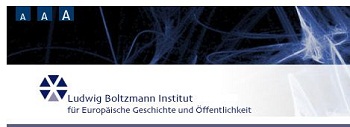Reconfiguring Backwardness: Polish Social Scientists and the Making of the Third World
Ludwig Boltzmann Institute for European History and Public Spheres, Nussdorfer Strasse 64, 4th floor
Date 18.10.2011 – 15:00
This presentation/research project aims to shed more light on the different genealogies of postwar modernity by examining the intellectual history of Eastern European involvement in the making of the Third World between the early 1940s and 1960s. During that period, the so called ‘international depressed areas’ divided gradually into socialist Second World and post-colonial Third World. The project focuses on the historically contingent process of translating Eastern European experiences into a blueprint for post-colonial policies, while tracing the origins of this process in the 1920s and 1930s as well as its consequences in the 1970s and 1980s. Investigating the shifting meanings of East European concepts of ‘backwardness’ and ‘underdevelopment’ is crucial to understand the intellectual reconfiguration of the non-Western world and how these reconfigurations turned into a promise of Third World development in an era of decolonization. In particular, this project asks how the internationalization of development economics, the core discipline of postwar social sciences, was mediated by a group of Polish scholars and experts. The project follows their professional and personal biographies in exile, under German and Soviet occupation as well as in Communist Poland, where they were eventually scapegoated as ‘Jews’ and ‘revisionists’ and had to pursue their academic careers outside Poland.
Małgorzata Mazurek is a post-doc fellow at Zentrum für Zeithistorische Forschung Potsdam. She graduated from Warsaw University and the Graduate School for Social Research at the Polish Academy of Sciences. She is the author of Socialist Factory: Workers in Communist Poland and the GDR on the Eve of the 1960s (Warsaw 2005), Society in Waiting Lines: On Experiences of Shortages in Postwar Poland (Warsaw 2010) and of several articles on comparative and social history of communist Poland in Polish, German, French and English. Her newest book project examines the Warsaw milieu of intellectuals in Communist Poland who were advisors of Third World countries and perceived them through the lenses of East Central European experiences of backwardness, occupation, forced industrialisation and state-planning.














